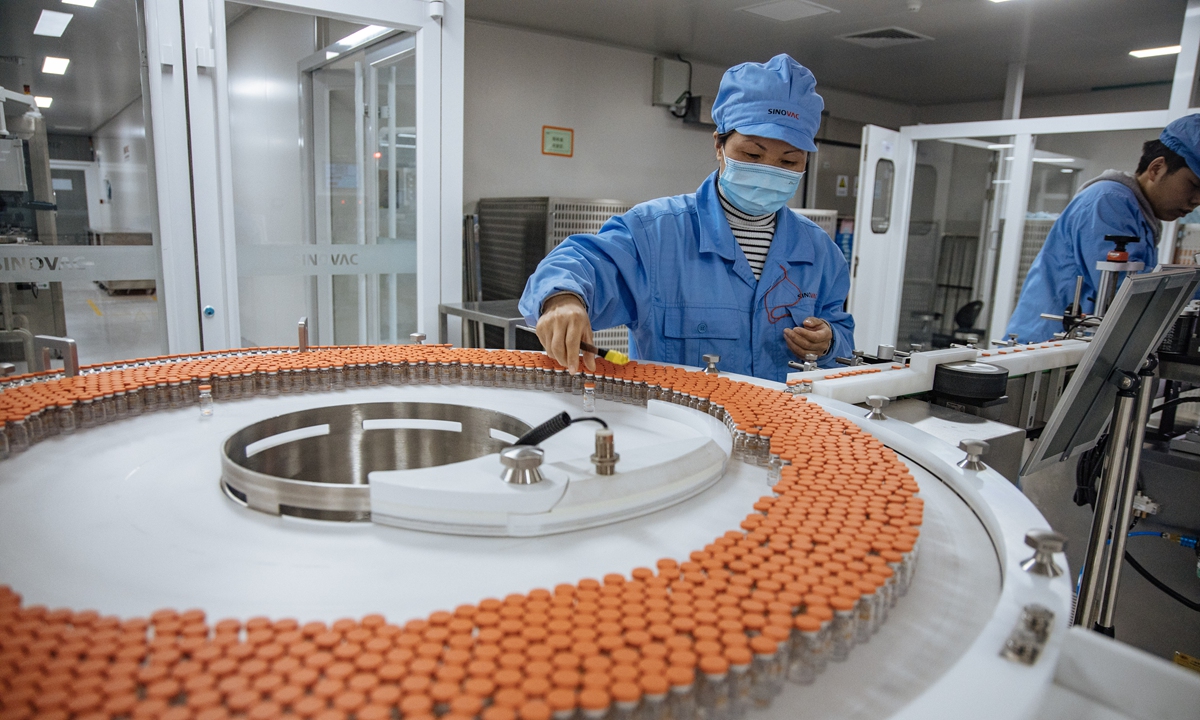
The COVID-19 vaccine Beijing manufacturing plant of leading Chinese vaccine producer Sinovac Photo: Li Hao/GT
After a coronavirus strain in Beijing's recent cases was reportedly found to be the same as a variant in the UK, public concern arose over the effectiveness of Chinese vaccines, especially after scientists found that new variants in the UK, South Africa and Brazil are more infectious than the original one.
A source at China's leading producer Sinovac brought encouraging news to the Global Times on Wednesday, saying that preliminary results showed antibodies given by Sinovac's dose can neutralize the UK and the South African variants, though a detailed report by scientists has not yet been published.
Chinese scientists are working with vaccine producers to study mutations, and lab studies are underway to understand the potential threat to Chinese vaccines.
All three variants in the UK, South Africa and Brazil have developed changes to the spike protein - a key part that attaches the virus to human cells. The UK variant has been found in more than 60 countries, according to the World Health Organization, while the South Africa variant has been detected in more than 20 nations.
The anti-epidemic work can be more difficult as the mutated forms of the virus spread more easily, Feng Zijian, a deputy director of the Chinese Centers for Disease Control and Prevention (CDC), said at a press conference on Wednesday.
Feng stressed that the mutations have not been found to cause significant changes in either virulence or the antigenicity of the coronavirus.
As China faces its largest annual human migration during the upcoming Spring Festival holidays, experts call for stricter prevention and control measures to contain the high risk of the virus being spread.
Chinese vaccines show preliminary effect against most variants like the ones from the UK and South Africa, whereas a similar conclusion for the Brazil variant still requires further tests, experts said.
The test against the Brazil variant may start soon if scientists obtain the real variant strain from imported cases, said the source, noting that the lab study requires high-level facilities such as Biosafety Level 3 laboratories.
Zhang Yuntao, a vice president and chief scientist of another leading manufacturer China National Biotec Group, said on Wednesday that current data shows the group's inactivated COVID-19 vaccines can protect recipients from various existing coronavirus variants from the UK, South Africa and Nigeria.
Chinese health department official Zeng Yixin said on January 9 the Chinese joint prevention and control mechanism moved swiftly and has established a specialized research group on the variant.
Compared with other types of vaccines, inactivated vaccines and mRNA vaccines are the two that respond most quickly and effectively to mutations, Shao Yiming from the China CDC, who was involved in China's COVID-19 vaccine approval, told the Global Times on Thursday.
Even in the worst case, the inactivated vaccines could be redesigned and tweaked for a better fit in no longer than three months, if necessary, said Shao. "But other technological routes may not be as fast."
"In theory, an mRNA vaccine can have more advantage against the variant. Both the humoral and cellular immune responses to RNA, compared with only the humoral immune response to inactivated vaccines, is more like a double-edged sword to deal with potential variation," Zhuang Shilihe, a Guangzhou-based clinician who closely studies vaccines, told the Global Times on Thursday.
Moreover, a key advantage of mRNA is that it can be redesigned and manufactured to respond to changing strains in the shortest possible time, which other types can hardly achieve, Zhuang said.
Vaccine giants Pfizer and BioNTech announced on Wednesday that their latest study shows the antibodies from people who have received their mRNA COVID-19 vaccine effectively neutralize coronavirus that has a key mutation that is also found in two highly transmissible strains.
Oxford scientists are preparing to design new versions of COVID-19 vaccines to deal with the risk of variants, media reported on Wednesday.
Scientists may see a similar scenario as that for flu vaccines, which change every year to cope with any changes in circulating viruses, Zhuang noted.




